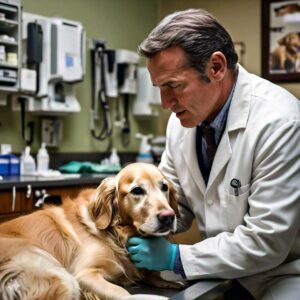Symptoms of Acute Kidney Failure in Dogs
No healthway post selected for this post.
Despite that dogs are a different species, their body functioning is very similar to human bodies. Dogs have kidneys to filter out waste and maintain nutrients in their bodies.
Kidneys also help calcium metabolism, increase red blood cell production, and control blood pressure.
If kidney function is damaged, it leads to a domino effect of health problems for your pup. Know the symptoms of acute kidney failure in dogs and tips you can follow to prevent and treat their condition.

What is acute kidney failure in dogs?
Acute renal failure is an unexpected decrease in functioning of the kidney that results from a decreased insult. Kidneys of dogs are composed of hundreds to thousands of microscopic filtering units known as nephrons. As blood flows through kidneys, waste products spread into the nephrons and are gradually eliminated as urine.
The ability of kidneys to filter waste products from the blood is affected by acute kidney failure, allowing them to build up, and your dog becomes sick. Water preservation is also affected, and dogs with acute renal failure become dehydrated because of loss of too much water in the urine. In intense cases, the kidneys can produce little urine, or close and cease urine production. In this way, symptoms of acute kidney failure in dogs become visible.
Causes of acute kidney failure in dogs
Anything that negatively and suddenly impacts kidneys of your dog can lead to renal failure, and common causes of acute kidney failure in dogs include:
Toxicity
Many toxins, such as antifreeze products and rodenticides, cause kidney failure in dogs. Ethylene glycol, which is present in various antifreeze products, causes the majority of toxicity-related acute renal failure issues.
Insufficient blood flow
Shock, gastric dilation volvulus, congestive heart failure, or any condition that deals kidney blood flow can lead to acute renal failure.
Infectious disease
Leptospirosis, which originated by a spirochete bacteria which infected animals shed in their urine, is another leading cause of acute kidney failure. Dogs usually contact leptospirosis by drinking water from contaminated sources, like puddles, lakes, and ponds.
Inflammatory diseases
In rare cases, an immune-mediated disease or glomerulonephritis can trigger acute renal failure.
Signs and symptoms of acute kidney failure in dogs
Chronic kidney disease is a kidney issue that has been present for months or years. Signs of dogs’ chronic disease can differ from slowly and subtly progressive to severe. They can sometimes appear suddenly. Early symptoms of kidney failure in dogs may include:
-
Drinking a lot and producing large volumes of urine
-
General depression linked with increasing waste products in blood
-
Overall weakness due to low potassium in the blood
-
Increased urine volume in the bladder
With the passage of time a dog experiences kidney failure, the disease has progressed and you may notice such signs as:
-
Blood in urine
-
Pale gums
-
Lethargy
-
Ulcers in the mouth
-
Vomiting
-
Inappetance
-
Intestinal seizures
-
Significant weight loss
-
No urine production
-
Decreased urine volume
-
Uncoordinated movements such as stumbling
-
Drunken behavior
-
Significant decrease in appetite
-
Breath which smells like chemicals
By the time a dog faces kidney failure, the disease has progressed and you may notice your veterinarian can examine your dog to find out whether kidney issues or other problems like diabetes mellitus are causing the symptoms. Factors that should be kept in mind may include the kind of renal failure your dog may be facing, the progression of the condition, underlying causes, and the extent of kidney functioning loss.

Diagnosing acute kidney failure in dogs
Your veterinarian will perform a series of urine and blood tests to confirm that your dog is suffering from kidney failure and to get a complete information of the level of the disease. Urinalysis, ultrasound, Radiographs (X-rays), and blood tests are commonly used when diagnosing acute kidney failure. The results of all these tests will also provide your veterinarian with more detailed information regarding the condition. In a few cases, a kidney biopsy may also be recommended.
Treatment of acute renal failure in dogs
Acute renal failure in dogs requires aggressive and prompt treatment for supporting the kidneys while they heal. With acute kidney failure, kidney functioning may return, whereas with CKD, kidney function is permanently lost, and the disease advances over time. Treatment of acute renal failure in dogs need intensive treatment and hospitalization, which may include:
Intravenous (IV) fluids
Fluid therapy is the one of the main acute renal failure therapy, and promotes urine formation, helps in normalizing internal fluid balance, and resolve flow issues of renal blood.
Continuous renal replacement therapy
CRRT uses progressed equipment for the removal of toxins from the bloodstream, related to dialysis. However, CRRT is done over 24-48 hours, instead of 3-4 hours. Dogs tolerate this period better, since pH, electrolytes, and fluid volume are normalized slowly over a longer time period. Some websites are proud to offer this advanced treatment that can particularly improve the prognosis for dogs experiencing acute kidney failure.
Electrolyte support
Electrolyte imbalances, like hyperkalemia (e.g., higher potassium), that result from waste buildup in the body can cause life-threatening cardiac arrhythmias, but are able to be managed with medications and fluids.
Nutritional support
If vomiting is under controlled, a liquid diet can be managed with the help of feeding tube; however, IV nutrition such as, total parenteral nutrition may be required if vomiting continuous. All these treatment options help to control symptoms of acute kidney failure in dogs.
Prevention of acute kidney failure in dogs
While you are unable to prevent all reasons for acute renal failure , you can avoid leptospirosis infections and ethylene glycol toxicity, which account for around 65% of acute renal failure cases. Follow below tips to keep your dog safe:
-
Keep all antifreeze products preserved safely out of reach of your
-
Wipe off all antifreeze spills and leaks immediately.
-
Discourage wild animals from entering, and likely urinating in, your yard.
-
Keep the leptospirosisvaccine of your dog up to date with yearly boosters.
-
Never let your dog roam where they may conflict with antifreeze, and drink the toxic liquid.
-
Don’t allow your dog to drink from outdoor contaminated water sources, such as rivers, lakes, ponds, and puddles.
If your dog develops acute renal failure, many experienced teams are available to provide the most advanced treatment options.
Can acute renal failure in dogs be reserved?
There are two various types of kidney failure – acute and chronic kidney failure. Acute kidney failure develops suddenly, and if diagnosed and treated quickly, can be reserved. While there is no cure or treatment for chronic renal failure, symptoms can be minimized with fluid therapy. Symptoms of acute kidney failure in dogs can be improved with the help of alternation in the diet of your dog.
No healthway post selected for this post.
